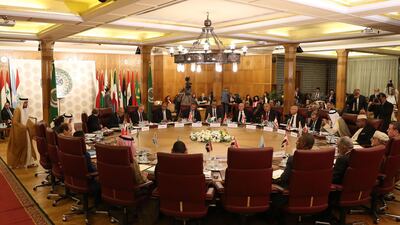The Arab League on Saturday condemned Turkey’s incursion in north-east Syria and warned of retaliatory measures unless Turkish troops withdrew from Syrian territory.
Ankara's offensive is a "direct threat to Arab national security", the bloc said in a statement issued after an emergency meeting of foreign ministers at its headquarters in Cairo.
The statement called for "ending the aggression and the immediate and unconditional withdrawal of Turkey from all of Syria's land".
Arab League chief Ahmed Aboul Gheit slammed the Turkish attack launched on Wednesday as an "invasion of an Arab land".
The bloc is considering diplomatic and economic actions in response to Turkey’s move, as well as "military co-operation to confront the Turkish aggression", the statement said.
Qatar, a close ally of Turkey, and Somalia registered reservations over the joint statement.
Iraq and Lebanon called for the reinstatement of Syria's membership of the Arab League, which was suspended in 2011 over its violent crackdown on protests at the start of its civil war. Mr Aboul Gheit said this would require certain measures from the Syrian side.
Turkey has pressed its offensive despite international condemnation and the threat of sanctions, including from the United States and other Nato allies in Europe.
On Saturday its troops and allied Syrian rebel groups entered the border town of Ras Al Ain, one of two key objectives along with the town of Tel Abyad about 100 kilometres to the west.
Ankara says it wants to clear a 30km-deep strip along the border of US-supported Kurdish forces that it regards as terrorists and resettle some of the 3.6 million Syrian refugees it hosting to this “safe zone”.
The Kurdish-led Syrian Democratic Forces, who were the main ground partner in the US-led campaign against ISIS in Syria, has called on the international community to establish a no-fly zone over the north-east.
"All we want from the international community is a no-fly zone so we can have a fair war with Turkey," SDF commander Redur Khalil said in a televised statement on Saturday.
Earlier on Saturday, Turkish troops moved to seize control of key highways in the region, the Turkish military said. Turkey's state-run Anadolu news agency said that Turkey-backed Syrian opposition forces had taken control of the M-4 highway connecting the towns of Manbij and Qamishli. The SDF said that Turkish troops and their allies reached the highway briefly before being pushed back again.
Turkish troops also cut the route linking the north-eastern city of Hassakeh with Aleppo, Syria's largest city and once commercial center, according to the Syrian Observatory for Human Rights, an opposition-aligned group monitoring the Syrian civil war.
The SDF have taken mounting losses against the vastly superior firepower of the Turkish army, losing 81 fighters since Wednesday, according to the Britain-based Observatory. Turkey's defence ministry said four of its soldiers had been killed.
Turkish air strikes on Kurdish-held towns and intense artillery exchanges have also caused civilian casualties on both sides of the border. On the Syrian side at least 28 people have been killed, according to the Observatory, and 17 are dead in Turkey, according to Turkish reports.
The Turkish campaign has raised fears of another humanitarian crisis, with about 100,000 civilians displaced by the fighting so far, according to the UN.
There are also fears that the conflict will allow a resurgence of ISIS and the escape of about 12,000 of the extremist group’s fighters who are being held in Kurdish-run prisons.
A car bomb exploded early on Saturday outside a prison where ISIS members are being held, but it was not immediately clear if there were any serious injuries or deaths. The Kurdish police police force known as Asayesh said the blast occurred outside the central prison in Hassakeh, much of which is controlled by Kurdish forces. The Observatory said after the blast, Kurdish fighters brought reinforcements to prevent prisoners from escaping.
French President Emmanuel Macron warned US President Donald Trump in a phone call that Turkey's military action in could lead to a resurgence of ISIS activity and "reiterated the need to make the Turkish offensive stop immediately," his office said in a statement Saturday.
France has pressed for the European Union to announce sanctions on Turkey at summit this week, but diplomats have said an arms embargo was more likely.
On Saturday, Germany joined fellow Nato members the Netherlands and Norway, along with Finland, in suspending arms sales to Turkey.
The US has also threatened Turkey with sanctions after Mr Trump faced a backlash from allies and opponents over his decision last week to pull back US forces from the Syria-Turkey border, which was seen as paving the way for the Turkish incursion.
US Treasury Secretary Steven Mnuchin announced on Friday Mr Trump had authorised the passing of "significant new sanctions" against Turkey.
The president "has authorised and will be signing a new executive order" giving the Treasury Department, in consultation with himself and US Secretary of State Mike Pompeo, the power to impose "significant new sanctions" targeting "any person associated with the government of Turkey”, Mr Mnuchin said.
The Treasury Department said the order aims to “dissuade Turkey from any further offensive military action in north-east Syria, including but not limited to indiscriminate targeting of civilians, targeting of civilian infrastructure, targeting of ethnic or religious minorities, or targeting or other actions that undermine the continued counter-terrorism activities of the Syrian Democratic Forces".
On Thursday night US defence chief Mark Esper called his Turkish counterpart Hulusi Akar, to urge Turkey to discontinue its military incursion into Syria, and warn of "serious consequences" on Ankara.
"Secretary Esper made it clear that the United States opposes Turkey's uncoordinated actions as they place at risk the progress made by the Defeat-ISIS Coalition," a readout from the Pentagon said.

